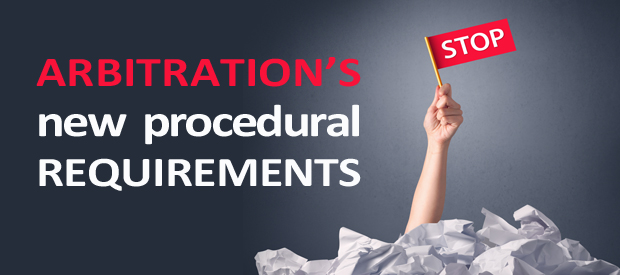“No More Arbitration for You!” – Part 2

In our previous blog we wrote about California’s Assembly Bill 51, which largely impacts arbitration agreements by prohibiting employers from requiring employees or applicants for employment to agree to arbitrate claims for FEHA (Fair Employment and Housing Act) or Labor Code violations as a condition of employment, continued employment, or receipt of employment-related benefits.
Assembly Bill 707 attempts to build additional barriers into the arbitration process by requiring employers to adhere to rigorous procedural requirements once arbitration is initiated, and imposing severe penalties if the requirements are not met.
General Background
The stated purpose of AB 707 is to protect consumers and employers when a company “stalls or obstructs the arbitration proceedings by refusing to pay the required [arbitration] fees.”
Accordingly, AB 707 adds Sections 1281.97 – 1281.99 to California’s Arbitration Act and codifies court decisions which held “that a company’s failure to pay arbitration fees pursuant to a mandatory arbitration provision constitutes a breach of the arbitration agreement and allows the non-breaching party to bring a claim in court.”
The Particularities
Under the new law, an employer that does not pay the fees and costs necessary to initiate or continue an arbitration, within 30 days after the fees/costs are due, is:
- in material breach of the arbitration agreement,
- in default of the arbitration agreement, and
- waives its right to compel arbitration (where an arbitration has not yet initiated), or compel an employee to proceed with the arbitration (where the arbitration is pending).
If the employer is in material default of the arbitration agreement before the arbitration commences, the employee may:
- Withdraw the claim from arbitration and proceed in court. Under this option, the statute of limitations is tolled and relates back to the date the claim was initially filed, and the employer must pay the employee’s attorney’s fees and costs as a result of the “material breach” or “abandoned arbitration proceeding” (as applicable). AB 707 further permits the court to impose evidentiary, terminating and/or contempt sanctions on the employer.
- Compel arbitration. If the employee decides to proceed with arbitration despite the material default, the employer must pay the employee’s reasonable attorney’s fees and costs related to arbitration.
If the employer is in material default of the arbitration agreement after the arbitration commences, the employee may:
- Withdraw the claim from arbitration and proceed in court. As above, the statute of limitations is tolled and relates back to the date the claim was initially filed, and the court may impose sanctions. The employee may also bring a motion or a separate action to recover all attorney’s fees and costs associated with the abandoned arbitration, regardless of whether the employee prevails in the underlying action.
- Continue the arbitration proceedings. Notwithstanding the employer’s default, the employee may continue the arbitration proceedings (as long as the arbitration provider agrees). Once the arbitration concludes, the arbitration provider may bring a claim against the employer to recover its fees and costs.
- Petition the court for an order compelling the employer to pay all arbitration fees. The employee can seek an order requiring the employer to pay the cost of the arbitration.
- Pay the employer’s unpaid fees. Although not a likely option, the employee may pay the cost of the arbitration and then recover the costs once the arbitration concludes.
If the employee elects to continue with arbitration, as specified in (2) – (4) above, the arbitrator “shall” impose “appropriate sanctions” on the employer, including monetary, issue, evidentiary or terminating sanctions.
What’s Next?
By enacting Assembly Bills 51 and 707, California clearly sides with the movement disfavoring employment arbitration agreement.
Employers are encouraged to review their practices and agreements to confirm compliance. This also includes a review of employment practices, such as payment of minimum wage, recording work hours and breaks, mandatory harassment training, etc. To best avoid the pitfalls of arbitration, protect yourself by knowing and complying with California law.
Nicholas Kanter and Tal Burnovski Yeyni are employment defense attorneys.

